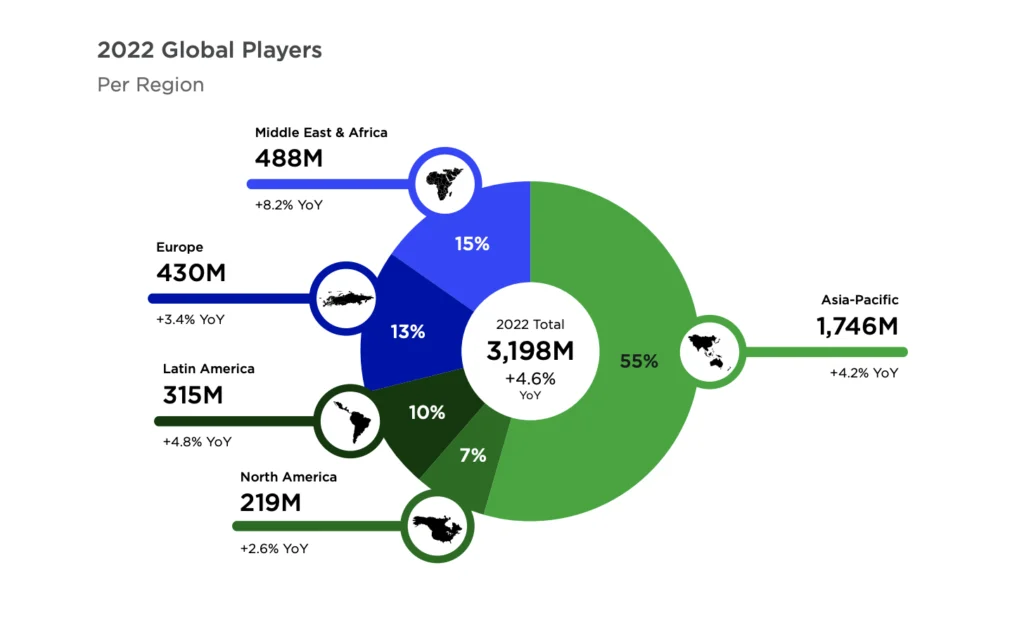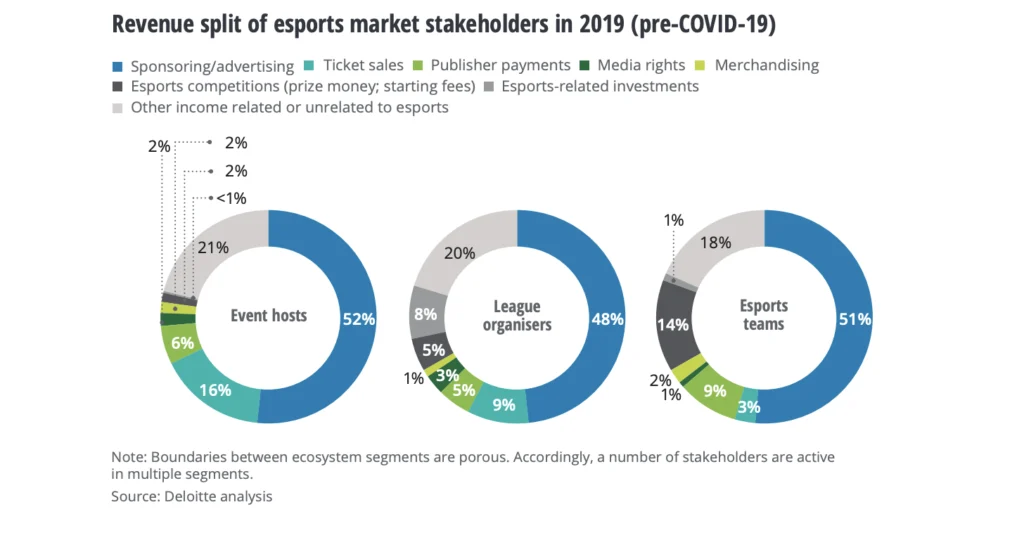The digital age has brought along hundreds of new ideas and possibilities, one of which was the merging of ‘sports’ and gaming. Despite the concept of video game competitions emerging in the early 70s, the ways in which these tournaments are carried out have changed with the passage of time. From arcade machines to desktop computers, to all types of different portable gaming devices, the industry has evolved along with society.
Understanding the key numbers of the eSports industry
The eSports industry is clearly on the rise; while in 2022 worldwide revenues are forecasted to reach $196.8 billion, expectations are for it to reach $225.7 billion (almost a 15% increase) based on projections carried by NewZoo. A big part of that increase comes from the fact that the worldwide audience is increasing; the same study reveals that by 2024 577,2 million people will watch some form of eSports competition, a 33% increase vs 2020, where about half of those viewers are considered “enthusiasts.”
Similarly, the most number of followers is located in Asia-Pacific (57%) while Europe and North America only account for 16% and 15% respectively, as per Newzoo. A myth that needs to be debunked though is that eSports are only for the younger generations; 83% of millennials and 70% of Gen X engage with games and in fact, almost half of baby boomers do the same.

(Source: NewZoo)
These figures seem to be related to the number of players located around the world. As of July 2022, there is an estimate of 3,198 million players in the world (a number expected to reach 3,534 million by 2025) where 55% are in Asia-Pacific, 13% in Europe, and only 7% in North America.

Source: NewZoo
One of the challenges for the eSports industry though is to diversify further its main sources of revenue. Currently, approximately 68% of the contribution comes from Sponsorship, while media rights (20%) and publisher fees (13%) complete the “top 3” sources.

Facing the same challenges as in traditional sport: A need for gender equality in eSports
Gender equality has always been an important talking point when it comes to sports due to the physical differences between men and women. But, is this still the case when it comes to eSports too? These physical attributes don’t come into play in competitive gaming, but there is still an important gap in the number of female competitors in comparison with their male counterparts. This stat is also carried over to fans and leaders in the industry, with a much lower representation at a professional level. Despite women making up 35% of global eSports players, only 5% compete at the highest level, giving way to vast inequality in the sector.
This barrier that women continue to face in a sport that should in theory present more opportunities for them has varied reasons behind it. From a lack of role models, whether it be as professional gamers o women in executive positions within the industry, females don’t have many women to look to for inspiration. Another important argument for this lack of representation is that many women feel that they are not taken as seriously as men, as stated by an anonymous female gamer in this report. In spite of progress in regard to sexism in recent years, it still remains to be one of the reasons why many women are scared to test the waters of the competitive gaming world.
Redefining the sports competition model
DUX Gaming and Paris Saint Germain are two sides of the same coin when it comes to eSports. Where many elite renowned sports clubs have created an eSports team, DUX Gaming which started off as a gaming side, have now created traditional football clubs, both male and female.
DUX is a gaming company founded in 2018 and is backed by pro footballers such as Real Madrid goalkeeper, Thibaut Courtois, or Real Betis striker, Borja Iglesias. In their short but successful history thus far, they have added two professional football teams (DUX Internacional de Madrid and DUX Logroño Women’s Team) and have gained a slot in the NBA2K League with a Mexican team, proving that eSports can be a door opener into other important ventures in the sports industry. CEO of DUX Gaming, Mario Fernández who will be present at WFSEurope this year, states what the goals of the company are:
«In our core as a club we like to do pioneering and disruptive things, not only in the world of eSports, but also in traditional sport, with the ambition to become what would be the first great club created in the 21st century.»
On the other hand, we can observe how many top clubs around the world are slowly immersing themselves in the gaming industry. A great example of this is PSG, who have become somewhat pioneers in the digital space as well, given the amount of new projects they are developing around new tech. Another example is their NFT strategy as mentioned by eShot Labs’ Fabien Arneodo to World Football Summit a few weeks ago. The French club founded its eSports team in 2016 and the organisation has active divisions in FIFA and League of Legends among other various games. In 2020 the club incorporated a youth academy for gamers called Paris Saint-Germain Academy Esports. The eSports section has collected 16 titles since its founding over 5 different games.
The future of gaming is in web3
It comes as no surprise that the future will include concepts such as Blockchain, NFTs, and Metaverse. These will also become gradually more present in eSports too. Tokenization is on a rise within the eSports industry and has allowed players to be able to take a more active role in their earnings rather than doing so through third persons. Many blockchain-based gaming platforms are being used by an increased number of eSports players, through which they can enjoy secure currency exchanges, lucrative promotions, and a widespread community of enthusiasts.
Another important introduction to the industry of eSports has been the Metaverse and Web3 through virtual reality and augmented reality which will help to increase the spectators and audiences of these competitions and tournaments, facilitating their interaction in such events.
The recent rise of NFT’s has also been present in the eSports world, with many fans investing in collectibles. There are also options that improve player skills within the game, this is called Play 2 Earn and it is expected that 35% of US players will adopt it in the near future.
Betting also has a fundamental role to play in the industry. Just like with any other traditional sport, bets can be placed on all types of eSports competitions too. Free from the restraints of manual data collection proper to traditional sports betting, and with huge amounts of accurate data to play with, bookmakers can provide customers with new and enhanced betting experiences. With both betting and eSports on the rise, it’s only natural that the fusion of both will continue to increase in numbers.
The eSports industry: A «best in class» example of how to empower a community of fans
The numbers paint the picture well; the eSports industry has earned its right to be considered one of the most relevant competitions in the entertainment space. Growth projections are positive and the rollout of new technology such as 5g or even blockchain will only help achieve greater «mass adoption.»
From both a «playing» and «entertainment» perspective, anybody around the world can feel more immersed in a tournament than in traditional sports. And, the closer that fans get to the game, the more engaged they will be. Additionally, one could argue there are lower barriers to entry for those looking to develop a career in eSports, which creates a greater sense of empowerment. This does not come without its challenges though such as the fact that competition to reach the pinnacle is fierce and that the career of an eSports player usually is short.
Looking into the future though, the experts seem to agree that web3 will empower users to a greater extent and that the «community» aspect will be key for brands to understand, which is something that eSport industry leaders pride themselves in. Everything around blockchain, NFTs, or tokens has a fantastic fit for the world of gaming, given that it creates the mechanisms for players and fans alike to own and benefit from unique digital assets that enable access to special skills, perks, or other utilities.
Moreover, Play-to-Earn dynamics will only help expand interest in eSports, as players will look to monetise directly from something they enjoy. In fact, GameFi seems to be one of the spaces that are growing more rapidly in the web3 universe.
All of these trends end up driving greater fan engagement, which in turn strengthens the communities of gamers around the world. This report by NewsZoo gives a nice view into the broad ecosystem that has been created as a result, but the truth of the matter is that it will only keep growing as the eSports sector keeps growing.
This insight features in the latest edition of WFS Digest, our insider’s guide to the latest and most relevant thoughts and practices from within the football industry. You can subscribe to WFS Digest HERE.





